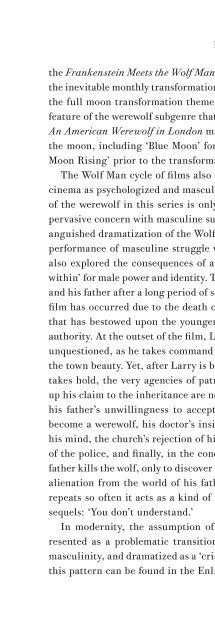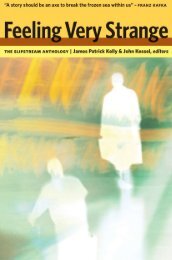The Curse of the Wer.. - Site de Thomas - Free
The Curse of the Wer.. - Site de Thomas - Free
The Curse of the Wer.. - Site de Thomas - Free
Create successful ePaper yourself
Turn your PDF publications into a flip-book with our unique Google optimized e-Paper software.
I USED TO BE A WEREWOLF<br />
<strong>the</strong> Frankenstein Meets <strong>the</strong> Wolf Man script syn<strong>the</strong>sized <strong>the</strong> concept <strong>of</strong><br />
<strong>the</strong> inevitable monthly transformation with <strong>the</strong> lunar cycle. Since <strong>the</strong>n,<br />
<strong>the</strong> full moon transformation <strong>the</strong>me has become such an entrenched<br />
feature <strong>of</strong> <strong>the</strong> werewolf subgenre that <strong>the</strong> soundtrack for <strong>the</strong> 1981 film<br />
An American <strong>Wer</strong>ewolf in London ma<strong>de</strong> humorous use <strong>of</strong> songs about<br />
<strong>the</strong> moon, including ‘Blue Moon’ for <strong>the</strong> opening sequence and ‘Bad<br />
Moon Rising’ prior to <strong>the</strong> transformation scene.<br />
<strong>The</strong> Wolf Man cycle <strong>of</strong> films also consolidated <strong>the</strong> werewolf <strong>of</strong> <strong>the</strong><br />
cinema as psychologized and masculine. <strong>The</strong> explicitly gen<strong>de</strong>red title<br />
<strong>of</strong> <strong>the</strong> werewolf in this series is only <strong>the</strong> most obvious signifier <strong>of</strong> a<br />
pervasive concern with masculine subjectivity in crisis, and Chaney’s<br />
anguished dramatization <strong>of</strong> <strong>the</strong> Wolf Man’s character was a <strong>de</strong>finitive<br />
performance <strong>of</strong> masculine struggle with <strong>the</strong> ‘beast within’. <strong>The</strong> film<br />
also explored <strong>the</strong> consequences <strong>of</strong> a failure to ‘discipline’ <strong>the</strong> ‘beast<br />
within’ for male power and i<strong>de</strong>ntity. <strong>The</strong> reconciliation <strong>of</strong> Larry Talbot<br />
and his fa<strong>the</strong>r after a long period <strong>of</strong> separation at <strong>the</strong> beginning <strong>of</strong> <strong>the</strong><br />
film has occurred due to <strong>the</strong> <strong>de</strong>ath <strong>of</strong> Larry’s ol<strong>de</strong>r bro<strong>the</strong>r, an event<br />
that has bestowed upon <strong>the</strong> younger son <strong>the</strong> heirdom <strong>of</strong> white male<br />
authority. At <strong>the</strong> outset <strong>of</strong> <strong>the</strong> film, Larry’s right to this inheritance is<br />
unquestioned, as he takes command <strong>of</strong> his surroundings and pursues<br />
<strong>the</strong> town beauty. Yet, after Larry is bitten by a werewolf and <strong>the</strong> curse<br />
takes hold, <strong>the</strong> very agencies <strong>of</strong> patriarchal power that had propped<br />
up his claim to <strong>the</strong> inheritance are now pitted against Larry: through<br />
his fa<strong>the</strong>r’s unwillingness to accept his son’s assertion that he has<br />
become a werewolf, his doctor’s insistence that <strong>the</strong> problem is all in<br />
his mind, <strong>the</strong> church’s rejection <strong>of</strong> him, <strong>the</strong> ineffectual investigations<br />
<strong>of</strong> <strong>the</strong> police, and finally, in <strong>the</strong> conclusion <strong>of</strong> <strong>the</strong> film, when Larry’s<br />
fa<strong>the</strong>r kills <strong>the</strong> wolf, only to discover that he has killed his son. Larry’s<br />
alienation from <strong>the</strong> world <strong>of</strong> his fa<strong>the</strong>r is articulated in a phrase he<br />
repeats so <strong>of</strong>ten it acts as a kind <strong>of</strong> refrain in <strong>The</strong> Wolf Man and its<br />
sequels: ‘You don’t un<strong>de</strong>rstand.’<br />
In mo<strong>de</strong>rnity, <strong>the</strong> assumption <strong>of</strong> power is <strong>of</strong>ten narratively represented<br />
as a problematic transition that is never<strong>the</strong>less central to<br />
masculinity, and dramatized as a ‘crisis <strong>of</strong> succession’. 41 <strong>The</strong> origins <strong>of</strong><br />
this pattern can be found in <strong>the</strong> Enlightenment, with its questioning<br />
79





